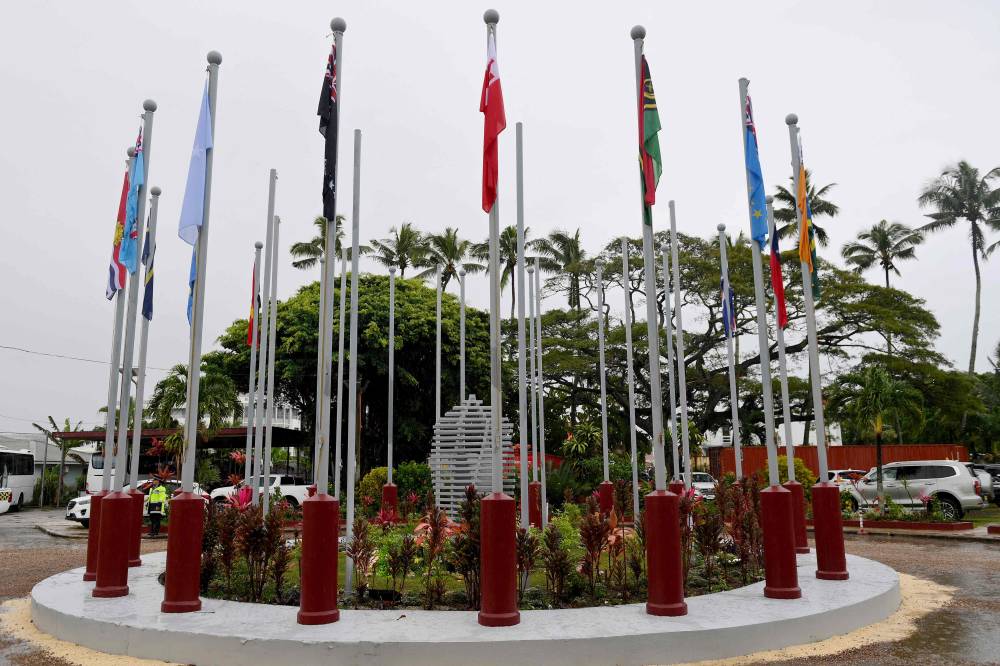UN chief airs ‘SOS’ for Pacific Islands
- Ocean temperatures three times higher in the region, amplifying storms, sea surges, coastal flooding

NUKU’ALOFA, TONGA—United Nations Secretary-General Antonio Guterres said on Tuesday ocean temperatures are rising in the Pacific Islands at three times the rate worldwide, and its population was “uniquely exposed” to the impact of rising sea levels.
Speaking to reporters in Tonga where the Pacific Islands Forum is being held, Guterres highlighted the findings of a report that showed the South West Pacific was worst hit by sea level rises, in some places by more than double the global average in the past 30 years.
“I am in Tonga to issue a global SOS—Save Our Seas—on rising sea levels,” he said.
“Rising seas are amplifying the frequency and severity of storm surges and coastal flooding. These floods swamp coastal communities. Ruin fisheries. Damage crops. Contaminate fresh water. All this puts Pacific Island nations in grave danger,” he said.
Water expands as it warms, contributing to sea level rise, he said.
A new WMO report showed seas had risen by around 15 centimeters in some parts of the Pacific in the last 30 years.
The global average was 9.4 centimeters, according to the report.
Climate change and security are dominating discussions at the week-long annual leaders meeting, where the 18 members of the Pacific Islands Forum are threatened by sea level rise. Also present is Australia, one of the world’s biggest exporters of coal.
Fossil fuels
Asked by a reporter about Australia’s export of fossil fuels, Guterres said fossil fuels must be phased out globally, although “the situation in different countries is different” and there would be different ways to do this.
The report released on Tuesday by the WMO showed ocean temperatures in the South West Pacific are increasing at up to three times the rate worldwide.
“Pacific islands are uniquely exposed. This is a region with an average elevation just one to two meters above sea level,” Guterres said.
“Half the infrastructure is within 500 meters of the sea,” he added.
“It is increasingly evident that we are fast running out of time to turn the tide,” said the WMO’s top official Celeste Saulo.
Some sites, particularly in Kiribati and Cook Islands, measured a rise that matched or was just under the global average.
But other sites, such as the capital cities of Samoa and Fiji, were rising almost three times higher.
In low-lying Pacific nation Tuvalu, land is already so scarce that throngs of children use the tarmac at the international airport as their own makeshift playground.
Scientists have warned that, even under some moderate scenarios, Tuvalu could be almost entirely wiped off the map within the next 30 years.
“It’s disaster after disaster, and we are losing the capacity to rebuild, to withstand another cyclone or another flood,” Tuvalu Climate Minister Maina Talia told AFP on the summit’s sidelines.
“For low-lying island states, it’s a matter of survival for us.”
Without cuts to global emissions, the Pacific Islands can expect additional sea level rise of 15 centimeters by 2050 and 30 days a year of coastal flooding, Guterres said.
‘Loss and damage’
The UN chief called for global leaders to “massively boost climate adaptation investments” in vulnerable countries.
A “loss and damage” fund to help poor nations cope with costly climate disasters was approved at last year’s UN climate summit, after years of lobbying by groups including the Pacific Islands, but the challenge remains to attract significant contributions to the fund from wealthier nations.
“Developed countries must deliver on their finance commitments—including the commitment to double adaptation finance to at least $40 billion a year by 2025,” Guterres said. —reports from REUTERS, AFP
AFP is one of the world's three major news agencies, and the only European one. Its mission is to provide rapid, comprehensive, impartial and verified coverage of the news and issues that shape our daily lives.
Reuters, the news and media division of Thomson Reuters, is the world’s largest multimedia news provider, reaching billions of people worldwide every day. Reuters provides business, financial, national and international news to professionals via desktop terminals, the world's media organizations, industry events and directly to consumers.





















